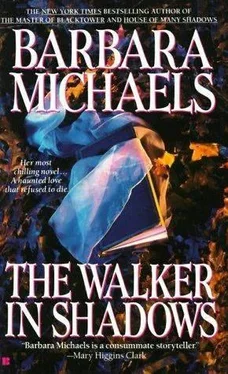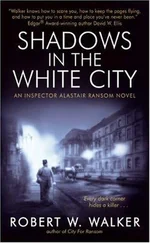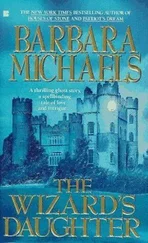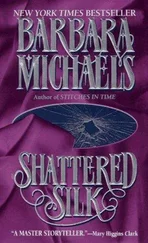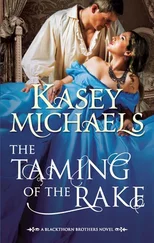Barbara Michaels - The Walker in Shadows
Здесь есть возможность читать онлайн «Barbara Michaels - The Walker in Shadows» весь текст электронной книги совершенно бесплатно (целиком полную версию без сокращений). В некоторых случаях можно слушать аудио, скачать через торрент в формате fb2 и присутствует краткое содержание. Жанр: Триллер, на английском языке. Описание произведения, (предисловие) а так же отзывы посетителей доступны на портале библиотеки ЛибКат.
- Название:The Walker in Shadows
- Автор:
- Жанр:
- Год:неизвестен
- ISBN:нет данных
- Рейтинг книги:5 / 5. Голосов: 1
-
Избранное:Добавить в избранное
- Отзывы:
-
Ваша оценка:
- 100
- 1
- 2
- 3
- 4
- 5
The Walker in Shadows: краткое содержание, описание и аннотация
Предлагаем к чтению аннотацию, описание, краткое содержание или предисловие (зависит от того, что написал сам автор книги «The Walker in Shadows»). Если вы не нашли необходимую информацию о книге — напишите в комментариях, мы постараемся отыскать её.
The Walker in Shadows — читать онлайн бесплатно полную книгу (весь текст) целиком
Ниже представлен текст книги, разбитый по страницам. Система сохранения места последней прочитанной страницы, позволяет с удобством читать онлайн бесплатно книгу «The Walker in Shadows», без необходимости каждый раз заново искать на чём Вы остановились. Поставьте закладку, и сможете в любой момент перейти на страницу, на которой закончили чтение.
Интервал:
Закладка:
"I'll go first," he announced. "It won't take long; I got a big fat zip. Kathy?"
Kathy's once-fresh print dress was crumpled and dusty. Gray smudges added piquancy to an otherwise almost too perfect face.
"Well," she began, modestly fingering her notes, "I didn't find much. I only got up to 1860. The editor of the paper was a Southern sympathizer, no question about that. His editorials on John Brown and the Harpers Ferry raid were-well, the way he gloated over Brown's execution was really awful."
"That raid hit Marylanders hard," Mark said. "Remember how close it was. Harpers Ferry is right up there in the corner where Maryland and Virginia meet what is now West Virginia. It was still part of Virginia then."
"But I didn't realize how many people in Maryland really believed in slavery," Kathy said. "Do you know how many voted for Lincoln? Less than three thousand! He got fewer votes than any other candidate. Brecken-ridge, a Southern Democrat, got more than forty-two thousand votes."
"The western part of the state was more sympathetic to the Union than the Tidewater area, with its big plantations," Josef said. "But I don't think there is much doubt that Maryland would have seceded if she had been given free choice. The Union could not allow that. All the rail lines and roads, even the waterways connecting the capital with the North passed through the state."
"What about the Turnbulls and the Bateses?" Pat demanded. "Were there any stories about them?"
"The Turnbulls were mentioned often," Kathy answered. "They must have been social leaders, or something. They kept having parties. Peter's sixteenth birthday was a big event, it rated a whole column in the paper-dancing in the garden by moonlight, magnolias in bloom, and all that. There were about fifty guests."
"Including the Bateses?" Pat persisted. She was beginning to take a proprietary interest in them.
"They were what you might call conspicuous by their absence. Can you imagine not inviting close kin living right next door? The war didn't actually start till 1861, when Fort Sumter was attacked. But South Carolina seceded in December of 1860, and I guess things were pretty tense even before that. Mr. Bates-"
"If nothing else comes out of this, you'll be well grounded in one period of American history," Josef said, smiling at his daughter. She looked unusually pretty in spite of her dishevelment. Her blue eyes shone like the best aquamarines.
"It's more interesting when you know the people," Kathy said naively. "Anyhow, Mr. Bates was really unpopular. There was a nasty editorial about him in 1859. It didn't mention him by name, but it hinted pretty strongly. All about abolitionists in our midst, undermining the law by stealing other peoples' property… Property! They were talking about slaves-human beings. How could anybody-"
"Slavery has only been illegal in this country for a little over a century," Josef said. "We were one of the last of the so-called civilized nations to outlaw it, but it had been accepted all over the world for thousands of years."
"That's right," Mark said. "The Greeks had slaves, didn't they? And medieval serfdom was essentially the same thing; a serf could be bought and sold, like an animal."
"So maybe we are making some progress, after all," Josef said.
"Not fast enough," Mark said. But he smiled as he spoke, and for a moment Pat saw a spark of understanding pass between the two men, a look that augured well for the future.
"I'd like to read more of the newspapers." Kathy said. "It was interesting."
"Interesting, but probably a waste of time," Josef said. "You haven't told us anything we hadn't already learned or surmised, Kathy."
"How about you, Mr. Friedrichs?" Mark asked.
"Very little. I got the impression that Turnbull was living beyond his means. All those parties… He sold land six times between 1850 and 1860. I don't know how much he started out with, but he couldn't have had much property left by the time he marched gallantly out to war, leaving his wife to manage as best she could while he was fighting for the Cause. He did leave her fifty slaves-one of the largest numbers recorded for the county."
"What about the Bateses?" Pat asked.
"They owned no slaves," Josef answered. "The census reports for 1860 show a household of two men, two women, and twelve household servants of the colored race-freedmen all."
The sun had sunk below the trees, and the evening breeze felt cool.
"I saw you were reading Mrs. Greenhow's book, Mom," Mark said. "Truth is stranger than fiction, right?"
"Well-bred lady spies, complete with hoop skirts and smelling salts, do sound like bad fiction," Pat agreed. "But some of the so-called historical romances I've read lately have had even more unbelievable plots."
"And even more sex," Mark said, grinning. "I can't believe Mrs. Greenhow ever writhed in the arms of her lover as his hands moved softly over-"
"Did you read that trashy book?" Pat demanded in outraged tones.
" Slave of Passion ," Mark said. He rolled his eyes. "You shouldn't leave stuff like that lying around, my dear."
"Shame on you, Mrs. Robbins, contaminating an innocent mind like Mark's," Kathy added.
It was her first contribution to the silly little exchanges Pat shared with her son, and her tentative smile showed that she wasn't quite sure how it would be taken. Feeling that she had been given some insight into the girl's relationship with her mother, Pat exaggerated her reaction.
"Innocent, she says. You should see the books he hides under his mattress."
Kathy giggled appreciatively. Her father muttered, as if to himself, "In my day it was Esquire . My mother found a copy in one of my drawers, open to the centerfold…"
"Well, back in those days people were uptight about sex," Mark said tolerantly. "I mean, you hadn't really advanced much since the Civil War period."
"I wouldn't say that," Josef objected. "Some of Petty's centerfolds were-"
Foreseeing another digression, Pat interrupted.
"Let's get back to Mrs. Greenhow. And no more writhings, please. I didn't finish the book, but the Turnbulls weren't mentioned in the part I read."
With his brows drawn together in the scowl that gave him such an uncanny resemblance to his father, Mark picked up a pencil and began doodling on the paper in front of him.
"It's so damned frustrating," he muttered. "All this blank paper, and nothing to put on it."
"Mrs. Greenhow was only one of many," Josef said, ignoring this outburst of petulance. "There was a regular espionage network in and around Washington during the war. With the enemy just across the river, it was easy to pass on news of troop dispositions and strategy; a man could paddle his boat across on a dark night-"
"Women did it too," Pat said, resenting the implicit chauvinism in Josef's speech. "One of Mrs. Greenhow's messengers was a girl, Betty Duvall. She drove a cart straight across Chain Bridge to Fairfax Courthouse, where the Confederates were, carrying the message in her hair. Nobody thought of challenging a simple little country girl."
"That's right," Kathy said. "I was reading a book at the library the other day, written by a woman who was ten years old at the time of the war. She lived in a town on the main road to Richmond, and she remembered a lot of Marylanders passing through on their way south. One of them was a sweet little old lady from Baltimore -I think her name was Alexander-whose son was in prison at Fort McHenry. She went to Richmond to get him a commission in the Confederate army so he would be considered a prisoner of war instead of an enemy agent. I mean, they hanged spies."
Pat shivered. Long blue shadows lay across the table. Mark, his eyes lowered, continued to doodle. Kathy glanced at him uneasily and went on, as if hoping to rouse him from his fit of the sulks.
Читать дальшеИнтервал:
Закладка:
Похожие книги на «The Walker in Shadows»
Представляем Вашему вниманию похожие книги на «The Walker in Shadows» списком для выбора. Мы отобрали схожую по названию и смыслу литературу в надежде предоставить читателям больше вариантов отыскать новые, интересные, ещё непрочитанные произведения.
Обсуждение, отзывы о книге «The Walker in Shadows» и просто собственные мнения читателей. Оставьте ваши комментарии, напишите, что Вы думаете о произведении, его смысле или главных героях. Укажите что конкретно понравилось, а что нет, и почему Вы так считаете.
